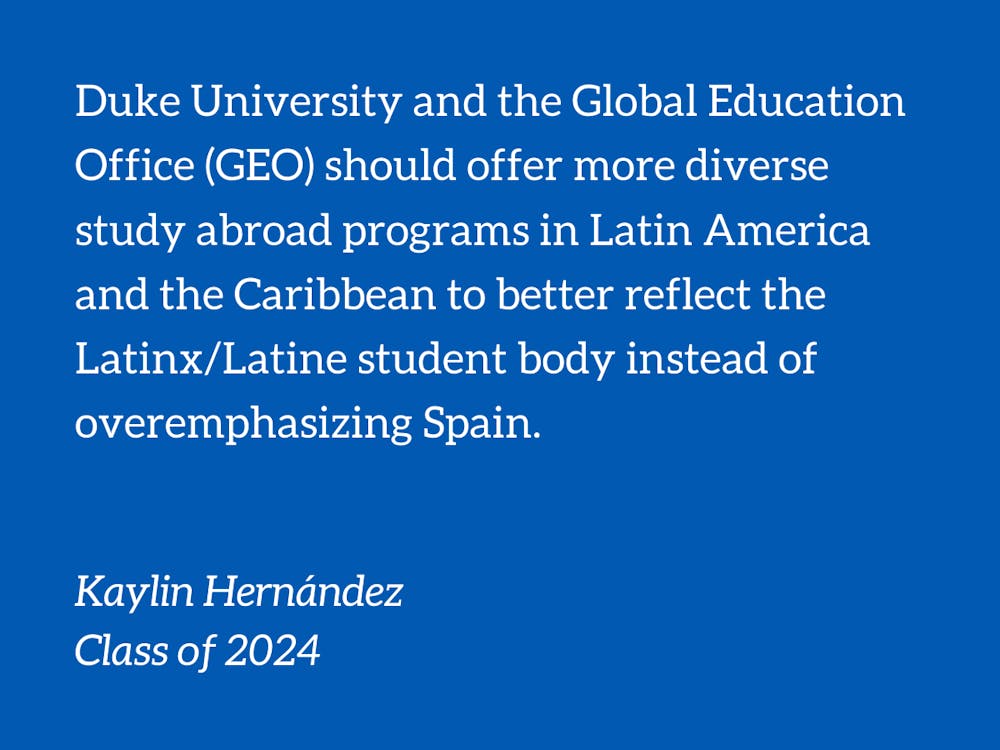Twelve Latinx organizations on campus have recently (re)demanded nine ways that Duke can improve representation and support for its Latinx students in and out of the classroom. I propose a tenth way to achieve this goal. Duke University and the Global Education Office (GEO) should offer more diverse study abroad programs in Latin America and the Caribbean to better reflect the Latinx/Latine student body instead of overemphasizing Spain.
I’m a white-passing Latina from South Texas who struggles to speak Spanish–not exactly the image one might conjure when they think of the Latinx community. Yet, our community isn’t as homogenous as some assume. The Latinx community consists of beautiful, diverse races, ethnicities, nationalities, food, cultures, histories, and even dialects! Yet, despite such diversity on a campus where roughly 10% of undergraduates are Latinx, Spain continues to be overemphasized as the representative of the Spanish-speaking world–especially in Duke’s study abroad programs. While many countries in Latin America have colonial ties to Spain, hence the term “Hispanic” for those with Spanish ancestry, Spain is not synonymous with Latin America. Spain even uses its own distinct “vosotro/a” pronouns while the rest of Latin America utilizes “ustedes.” Overemphasizing Spain impacts underrepresented and underserved students with limited options the most. The lack of program diversity is against the GEO’s mission to deliver programs that offer “a mosaic of cultural and personal experiences” and Duke’s commitment to diversity and inclusion.
My experience trying to find a representative study abroad program may be one of many experienced by Duke students. Considering 49% of Trinity graduates from the class of 2020 studied abroad, I never once doubted that I, too, would apply to a study abroad program during my time at Duke. Studying abroad presented the perfect opportunity for me as a low-income, fourth-generation Mexican-American Hispanic student to fully immerse myself in my far-removed ancestry. By studying abroad in a Spanish-speaking country, I was hopeful that I could finally reclaim my family’s Spanish language and Mexican heritage that the Texan government stripped from my family over generations via strict English-only school restrictions and open discrimination against immigrants and the Mexican-American population. However, given my insufficient Spanish-speaking abilities, status as a Trinity student, and program availability, my dreams of rediscovering my family’s culture were not as feasible as I thought.
There are zero “Duke-In” study abroad programs in Mexico. Duke-In programs are the only study abroad programs where a student can receive financial aid support. Further, Duke’s GEO doesn’t even include Mexican universities on their “Duke-Approved” study abroad program list. Of course, students can petition for a program in Mexico to be “Duke-Approved.” Yet, Duke still restricts travel to over a dozen Mexican states because of US sanctions or the “elevated risk” of “health, safety, and security.” However, other universities, such as UNC, continue to host programs in states like Guanajuato, a region deemed “restricted” by Duke.
There are four separate “Duke-In” study abroad programs in Spain; yet, the GEO only offers three between Chile and Costa Rica, all requiring a Global Health concentration, Pratt status, or advanced Spanish language level requirements. While “Duke-In” Spain programs accept all Spanish language levels, the “Duke-In” programs in Chile and Costa Rica require at least an upper-intermediate understanding of Spanish. Even on the “Duke-Approved” programs list, there are only three Latin American countries for students to choose from: Argentina, Chile, and Ecuador. This is not inclusive of a community with a long history of forced assimilation, oppression, and neglect.
Duke’s Latinx community deserves more. Thus, unofficially on behalf of my community, I demand more attention to the Latinx community’s diversity here at Duke. The lack of inclusive study abroad opportunities reflects a failure to acknowledge the plethora of characteristics that define our community. Moreover, it further represses Latinx cultures, limits our access to emotionally-engaging academic pursuits, and favors our Spanish conquistadores. With the inclusion of Latinx students and faculty, let’s add more programs to the financially-supported “Duke-In” list. Or, if that’s not feasible yet, let’s expand the list of “Duke-Approved” programs and offer grants to make them more accessible to students. There are 21 Spanish-speaking countries in Latin America and the Caribbean. Spain is a culturally-rich country, but most Latinx students don’t claim it as their ancestral homeland nor do they prefer programs in Spain. There is power in representation, and a prestigious institution like Duke can start with what they do best: provide world-class education through diverse perspectives.
Kaylin Hernández is a Trinity sophomore studying Public Policy and Political Science.
Get The Chronicle straight to your inbox
Signup for our weekly newsletter. Cancel at any time.

